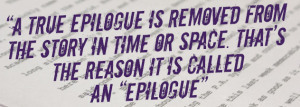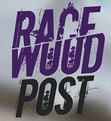To Epilogue or Not To Epilogue?

 hen it came to book 2, there was a certain point at which my editor suggested that I should probably end the book at a certain chapter and make that the epilogue. I disagreed, mostly because first of all it’s only the second book in the trilogy, wouldn’t an epilogue be a little premature? But second, I didn’t want to end it there. So I didn’t. But it did get me thinking… does the rule for prologues also apply to epilogues? At what point is an epilogue better than simply a final chapter? What’s the difference and can you write an epilogue that maybe should have just been the next/last chapter?
hen it came to book 2, there was a certain point at which my editor suggested that I should probably end the book at a certain chapter and make that the epilogue. I disagreed, mostly because first of all it’s only the second book in the trilogy, wouldn’t an epilogue be a little premature? But second, I didn’t want to end it there. So I didn’t. But it did get me thinking… does the rule for prologues also apply to epilogues? At what point is an epilogue better than simply a final chapter? What’s the difference and can you write an epilogue that maybe should have just been the next/last chapter?
According to Writer’s Digest : “A true epilogue is removed from the story in time or space. That’s the reason it is called an “Epilogue”; the label serves to alert the reader that the story itself is over, but we are going to now see a distant result or consequence of that story.”
This is a wonderful definition and I like that the whole of the article was about ways in which to end a novel, it is perhaps one of the most challenging elements in writing fiction, next to starting a novel. But somehow I’m not sure this entirely answers my question (at least with regards to my own novel). See when it comes to book 3, I have known for a long time how it’s going to end and for a while now I’ve been sort of debating whether or not it ends on an ‘Epilogue’ or just Chapter 46 (whether or not I actually make it to 46 is going to be debatable but that’s my goal). Technically speaking the ending is removed from both the story time and space and it’s sort of a consequence of the story, but it’s not actually a scene per se, which makes it a little harder to name.
Technically, it is my story so in theory I could title the final chapter anything I wanted, but if I’m going to call it an “Epilogue” I’d like it to really be an epilogue. Honestly I actually haven’t read all that many novels that have epilogues to them so as a literary device I kind of feel like most authors either don’t care for them or don’t feel they are entirely necessary. There are a lot of ways to end your novel, especially if it’s a series (or in this case a trilogy). You can end on a cliffhanger (as in the case of book 2) or even a complete plot-twist, or a full drawn out ending. Or… you can write an epilogue. An end within an end, if you will. I think especially for a series epilogues are a good idea because it can give you some amount of finality to the entire storyline,






